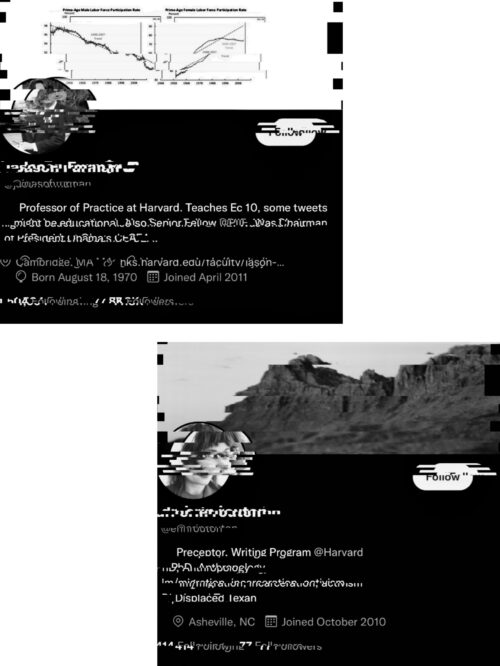Have you ever gotten nearly 13,000 likes on a tweet? No? Me neither. Believe it or not, some of Harvard’s most beloved professors have. Indeed, Economics Professor Jason Furman’s most popular tweet has received 13.2k likes and 2.4k retweets—even more likes than Justin Timberlake earns.
“I try to generally stick to things where I bring a certain amount of expertise to the topic and have something to contribute,” Furman says. He began his Twitter journey when he was encouraged to start a page during his time as the Chair of the Council of Economics at the White House. Today, he continues to use it for professional purposes, posting commentary on current economic and political issues such as President Joe Biden’s Build Back Better Plan, US unemployment levels, and vaccination and tax policies. He engages with a much smaller audience on Instagram and Facebook to share aspects of his personal life.
Professor of Cultural Anthropology Erin Routon is also an active participant in social media. She began using Myspace and Facebook as an undergraduate student to stay in touch with friends and family, and is currently active on Instagram, Twitter, Tiktok, and LinkedIn, which she uses at least once a day. “I like to share my own and others’ publications, research projects, and poignant reflections on political issues relative to immigration and incarceration,” Routon says. “Twitter has been an ideal place for me to connect with scholars at other universities, particularly those who work in similar realms of research.”
Routon and Furman concur that the social media platform aids their professional development. Using Twitter is like “sitting in a seminar, only it’s going on 24/7, and like a seminar, people propose amazing ideas that you may never have thought of,” Furman shares. “I love that I can reach such a range of people from the very top officials in government to high school students.”
Twitter has allowed him to focus on his field of study, economic policy. “Part of my goal is making changes in public policy,” he says. “I believe that if people understand better, you will have better outcomes—it’s not just about asserting things but explaining things.”
Twitter has allowed him to focus on his field of study, economic policy
But Twitter has its shortcomings. “I dislike the viciousness and the dunking on people,” Furman comments. Agreeing, Routon says that the only way Twitter “substantively detracts from my work is when the content is actively harmful, thus, at times, affecting my mental health.” This harmful content ranges from racists comments to homophobic and misogynistic remarks.
However, social media provides a space to get inspired and inspire others. Routon seeks to expose herself to conversations and debates that she might have not otherwise encountered. “This helps me in trying to become a better teacher, which I consider to be a continuous project,” she says.
Both professors have assumed the responsibility of teaching others through social networking. “I don’t want to just share my opinions,” Furman shares. “I want to help frame the questions and help people better understand the issues.” Routon also acknowledges the importance of using her network to display her work. “As a researcher as well as an instructor, I get to share my research with others.”
And how does a professor use social media for fun? Furman spends his leisure time exploring accounts centered on classical literature, science fiction, and the Red Sox. On Tiktok, Routon follows many creators: “I appreciate all of these people for their critical social insight and funny content.”
While social media has increasingly taken over our everyday lives, personal connection remains of the utmost importance. Dean of Students Rakesh Khurana uses a variety of media platforms to communicate with the Harvard community. His popular Instagram page shares photos of his encounters with students and employees almost everyday. “He sees his Instagram account as a fun and engaging way to highlight the vibrancy of life on campus,” says Rachael Dane, Director of Media Relations. But “while social media makes it easy to share information, he much prefers meeting people in person,” she adds. Although social media can help build a sense of community, in-person connections are hard to replicate—and are generally preferred by students and faculty alike after over a year of virtual learning.
As social media can be both a recreational platform and a detrimental space, Routon and Furman suggest students focus on using social media to their productive advantage. Many Harvard students are media-savvy, but perhaps they could be more media-conscious. “Trying to take stock of how a particular site is serving you, in your goals, as well as how it consistently affects your mental well-being, is important,” comments Routon. She advises students to do this by “differentiating the ways in which particular spaces are productive.”
Students can also use social media as a space for intellectual stimulation. “Make sure to follow people you disagree with, follow people that disagree with each other,” Furman encourages. “Follow people who you can’t quite predict what they are going to think about every topic.”
Evidently, our professors have large digital footprints—but they seem to use social media constructively and not as a waste of time. Maybe Harvard students can learn a thing or two from them outside the classroom.
Ariel Beck ’25 (arielbeck@college.harvard.edu) is studying her professors’ social media strategies.

